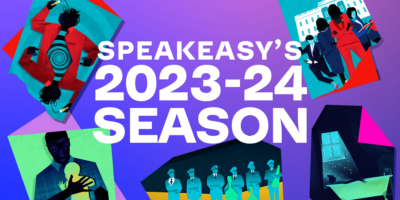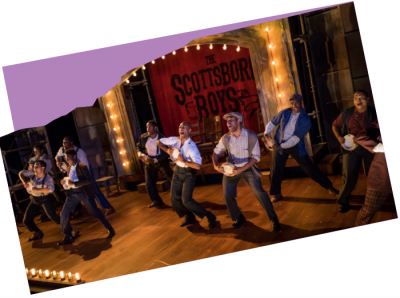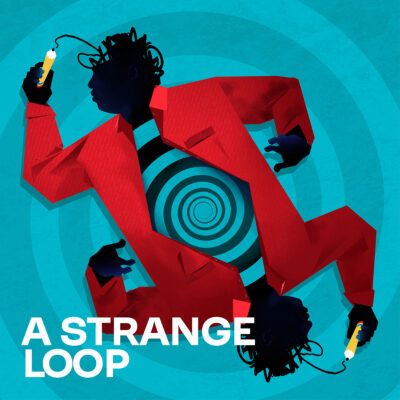Your donation sets the stage for a new season of Boston's most intimate, entertaining and provocative plays and musicals. Our shows make powerful connections with our audiences-- and they are only possible because of you.
Interview with Michael Friedman
Interview with Michael Friedman
Interview with Michael Friedman
 What was your exposure to theater growing up, and what contributed to your tastes musically and theatrically when you were starting out?
What was your exposure to theater growing up, and what contributed to your tastes musically and theatrically when you were starting out?I come out of the music side of things, I was a classical guy, so theatrically, I always want to have my easy list of influences, and it’s always the really boring greats: Rogers & Hart, Frank Loesser. But in a funny way, I think those are, theatrically, the things I still come to. Obviously, Sondheim looms, and there’s nothing you can do about it. I have enormous respect for Sondheim, and at the same time I think that’s a tough act to follow. Theatre is something I have always loved, but I was not really a theatre person; I kind of fell into it almost by mistake, if that makes any sense. I’ve picked it up as I’ve gone along, but on everything I’ve been a bit of a late bloomer.
In other interviews you’ve talked about the “artistic blind date” that got you and Alex [Timbers] started on Bloody Bloody Andrew Jackson. Did you come into that meeting knowing that you wanted to do a musical?
No, it was literally just, like, “Hey, what do you do?” By blind date we mean Blind. Date. The joke of it is that after an hour we did know we were going to do a musical and it was going to be about Andrew Jackson, and that it was gonna be emo and all that stuff, but that half of things definitely came from Alex because I’m too old, to be honest. I’m too old to be emo. So for me it was doing a huge amount of research and spending an enormous amount of time listening to Dashboard Confessional. I think what we both had was the interest in how theater can deal with historical or non-fiction subjects in a way that’s’ still theatrical. I think we get trapped in a theatre world in which in which people are just in their living rooms around couches, and I think Alex and I are both interested in ways to not do that, and take on subjects that are outside that. Like, how do you do the equivalent of an awesome history book on-stage. People complain about some shows by saying that they’re like a history book, but it’s like, “Well, maybe it’s like a bad history book,” sure. But not all theater needs to be like a short story. So to me, I think that is what brought us together.
Alex mentioned that in the initial talks, you were the one who had the AJ idea and he was the one who had the emo idea, which was a bit of an inversion of what I had assumed.
With Alex it’s amazing; he always very sweetly says nice things about me as a dramaturg, and to me, what’s amazing about him is how many specific and important insights he has into how the music should be. I think a good collaboration means that you are really in each other’s business, and that it’s okay because you have the trust there. I think you get in trouble if you’re too precious about “This is my department I do the music,” and “This is my department I write the talking bits.” And so when you can work with a director or a writer who knows about music it’s so much better and makes your job a lot easier.
After that initial meeting, was the process of creating the show just more meetings as you developed things in tandem? How did it evolve in that initial first stage?
We decided to go to the Williamstown Theatre Festival, which had offered us a chance to do something with the non-Equity company there, I think very much against my will, so Alex kind of dragged me kicking and screaming. He had kind of written a first act, which is what we call the first twenty minutes of the show, and I had written nothing. And by the time we got there I had written two songs, and by the time we left I had written eight songs, so it was almost a way to force it. I would wake up every morning at five am and write a new song. So, Williamstown sort of forced us to write the show, and while many new songs and many new bits of the show changed in Los Angeles and at the Public and on Broadway, the basic shape of the show was formed at Williamstown. The ability to go there and work with it, and in a funny way to have the lack of pressure, because it was a non-equity company, where you aren’t opening with famous people somewhere, allowed us to really see what we wanted. We came out with the show we wanted.
As the songs were developing, since the styles are so varied, with those very rocking kind of emo numbers and then numbers like “The Corrupt Bargain,” which is that very vaudeville style, was it—
With “Corrupt Bargain,” I said when we were trying to figure out how to do that piece of history, I said “Well I don’t want to just do some dumb number that would be like, ‘Doin’ the Corrupt Bargain!’” And of course that was the number I wrote.
That was exactly what happened.
Which is to admit a truth, that I haven’t really talked about before, but the opening number came from me saying, “I don’t know, what do you want the opening number to be?” And Alex said, “It could be something about populism,” and I was just like, “Like what? Populism, Yea Yea!” Half the work I do is usually me saying, “Well, I can’t do that,” and then that happens.
I think that’s a pretty good approach for theatre in general, though.
I think sometimes you’re running from the obvious, and you just have to accept the fact that the obvious is often obvious because it’s right.
Were the initial songs you were writing the more classically emo ones?
The first song I wrote was “Populism,” the second was “I’m Not That Guy,” the third was “I’m So That Guy,” The fourth was “Ten Little Indians,” the fifth was “Illness as Metaphor,” and then I wrote the songs that became “The Saddest Song,” “Public Life,” and “Second Nature,” which was the last song I wrote in that first eight. So, as I said, the full shape of the show…and then “Crisis Averted,” the song for his wife, and “Rock Star” came later.
Other than that initial phase in Williamstown, was there a point during the show’s development that you feel kind of looms as a major turning point, where the context changed?
Certainly when Michael Ritchie, having only heard the album from Williamstown, agreed to produce the show at Center Theater Group, that was a huge deal because that is a major and wealthy and amazing theater to get the chance to do a show at. And then similarly when Oscar Eustis got on-board at the Public, and we moved to Broadway. All three of those were big deals for all of us, and other than that it was mostly that every time we did the show the politics of the country had changed, and so the context of the show changed. Events tended to overtake us. In a funny way I feel like the Tea Party came to our show, rather than our show coming to the Tea Party. Or Obama, or Sarah Palin, or, or, or, or. It’s kind of amazing now watching people do the show in this election cycle, because the show has a completely different context in the Romney/Obama debates. Right now, the thing in the show that moves me most is Jackson singing, “When it stops being fun/and your patience is done/and you see being President’s hard.” Which, y’know, with Obama, being president is so f**king hard. And that was a lyric that, when we first wrote it, was in the context of George W. Bush and the Obama election, so it takes on a new meaning now.
Do you feel like having to go through those political shifts has made the show more of a template, that can apply itself to a whole lot of different conversations?
I’d say after our first burst of energy, where the show was very much about Dubya, initially, Alex saw that Jackson was also like Reagan, going over the pundits to the people. But he’s also like Bill Clinton, where he’s the first President who really feels your pain, or he’s like Jimmy Carter, and then suddenly he’s like Obama, like Sarah Palin, or like the Tea Party. He’s actually like FDR, Lincoln, the consolidation of executive power…he’s every president since. You have to give Washington props for figuring out how this institution could work, and wouldn’t be a monarchy, and would succeed, and for stepping down. But Jackson, in terms of the definition of how you campaign, and how you are elected and what it means to be President and how to have two terms, how you relate to the Senate and to Congress and to the Judicial Branch, and all those things, all of those are him. The amazing part has been watching that he is, for good or bad, so crucial to how all politics have been, moreso than any president except Washington.
There seems to be something about populism that is about being all things to all people, in a way.
I think he was the first person who really figured out how to do that, whether he realized it or not.
This is a cruel question to ask so many years out, but do you remember roughly where in the process that revelation came?
Alex had it very early. I certainly think we felt it by the end of our time at Williamstown. So, pretty early, also because I think there were new books and new things coming out about Jackson at that point, so it was in the air.
Were you seeing those changes and shifts in the political sphere reflected in the audiences you were getting?
Certainly each ensuing audience has read the show towards the politics of its moment. Our first preview at the Public was the same night that health care was getting passed, so you had the Tea Party and everybody outside the capital, and watching that while we had all those people outside of “Rock Star” with their signs, that was pretty extraordinary. And of course that was that moment, and now we see in the election cycle this moment.
There’s something of a compulsion from so many people to figure out whether this show has a positive or negative opinion of Andrew Jackson.
I think we’re on the storyteller’s side at the end, when she says “You can’t shoot history in the neck.” In a previous draft I had a lyric which I really liked but never worked in the show, which was, “History makes its judgments slow.” And that, I think…you’re gonna be dead before we know how we feel about you.
You’ve talked in earlier interviews about balancing the comedy of the first half with the pathos or bearing down that happens in the second half. Was that a balance that shifted as you moved the play forward after Williamstown?
I think we always knew that we wanted it to be about, at least partly, the adolescence of America, and the question of maturity. Jacksonian America is the moment at which we realized that this nation was not only going to stick around, but was going to be big, for better or for worse. We always wanted the show to have a sort of brash juvenility in the beginning of the score, and then it goes through some growing pains. And by the halfway point, right around “Rock Star,” it takes a turn and by the end I think the book and the music and lyrics take on a new sense of maturity or at least a new attempt at maturity. I’m not sure we can hope for more than an attempt, but we’re trying to mirror what’s going on for Jackson and for America in the way that the show is written.
 Join us for spectacular season 33!
Join us for spectacular season 33! Past Productions
Past Productions a strange loop
a strange loop




